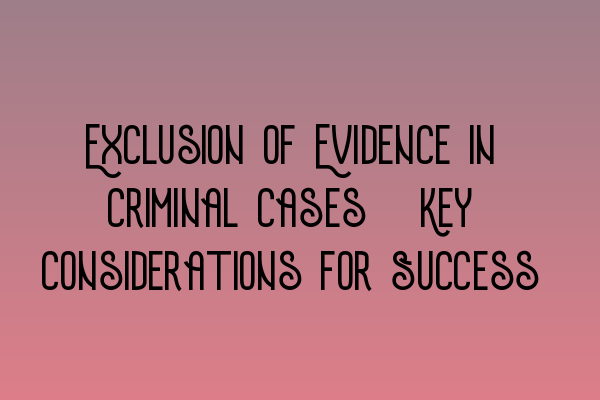Exclusion of Evidence in Criminal Cases: Key Considerations for Success
In criminal cases, one of the most powerful tools available to a defense solicitor is the exclusion of evidence. Excluding evidence can significantly impact the outcome of a case, potentially leading to an acquittal or a reduced sentence for the defendant. However, successfully excluding evidence requires a thorough understanding of the legal principles and a strategic approach. In this article, we will explore the key considerations for success in excluding evidence in criminal cases.
The Importance of Proper Documentation and Preservation
Proper documentation and preservation of evidence are crucial from the outset of a criminal case. As a defense solicitor, it is essential to ensure that all relevant evidence is collected, analyzed, and appropriately documented. This documentation will serve as the foundation for any arguments made regarding the exclusion of evidence.
Moreover, it is important to be aware of any potential issues with the collection and preservation process. For example, if evidence has been mishandled, contaminated, or obtained unlawfully, there may be grounds for exclusion. By thoroughly investigating the collection and preservation procedures, a solicitor can identify potential weaknesses in the prosecution’s case.
The Role of Legal Expertise
Excluding evidence requires a detailed understanding of the relevant laws and procedures. As a defense solicitor, it is essential to stay updated with the latest legal developments and precedents. This knowledge will enable you to identify potential legal arguments and develop a strong defense strategy.
Consulting with legal experts and attending relevant training and continuing professional development (CPD) courses can significantly enhance your understanding of the exclusionary rules. SQE preparatory courses, such as SQE 1 Preparation Courses and SQE 2 Preparation Courses, can provide a comprehensive overview of the exclusionary rules and their practical application.
Challenging Unlawful Searches and Seizures
One of the most common grounds for excluding evidence is an unlawful search or seizure. If the police or other law enforcement agencies have conducted a search without a valid warrant or have exceeded the scope of a valid warrant, the evidence obtained may be deemed inadmissible.
It is crucial to closely examine the circumstances surrounding the search and seizure. If there are indications of misconduct or a violation of the defendant’s rights, it is essential to raise these issues with the court. A solicitor can argue for the exclusion of evidence by demonstrating that the search or seizure was conducted unlawfully.
Establishing Unreliable or Inadmissible Evidence
Another strategy for excluding evidence is to demonstrate its unreliability or inadmissibility. Evidence may be unreliable if it is based on hearsay, lacks sufficient corroboration, or if there are doubts about its authenticity or integrity. Additionally, evidence obtained through coercion, duress, or the violation of the defendant’s right to remain silent may also be excluded.
To successfully exclude evidence based on unreliability or inadmissibility, it is necessary to present convincing arguments supported by case law and legal principles. As a solicitor, your expertise and familiarity with the relevant rules of evidence will be invaluable in developing and presenting these arguments effectively.
The Importance of Effective Communication
Successfully excluding evidence also requires effective communication with the court and opposing counsel. It is essential to clearly and concisely articulate your arguments for exclusion, highlighting the relevant legal principles and case law.
By integrating persuasive language and presenting your arguments in a logical and organized manner, you can effectively convey the importance of excluding the evidence in question. This requires a strategic approach and a deep understanding of the specific facts and circumstances of the case.
In Conclusion
The exclusion of evidence in criminal cases can have a significant impact on the outcome of a case. By carefully considering issues such as proper documentation, legal expertise, challenging unlawful searches, establishing unreliability or inadmissibility, and effective communication, solicitors can increase their chances of successfully excluding evidence.
For further practice and preparation, you may find the following related articles useful:
